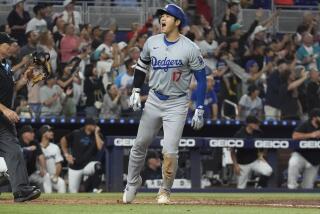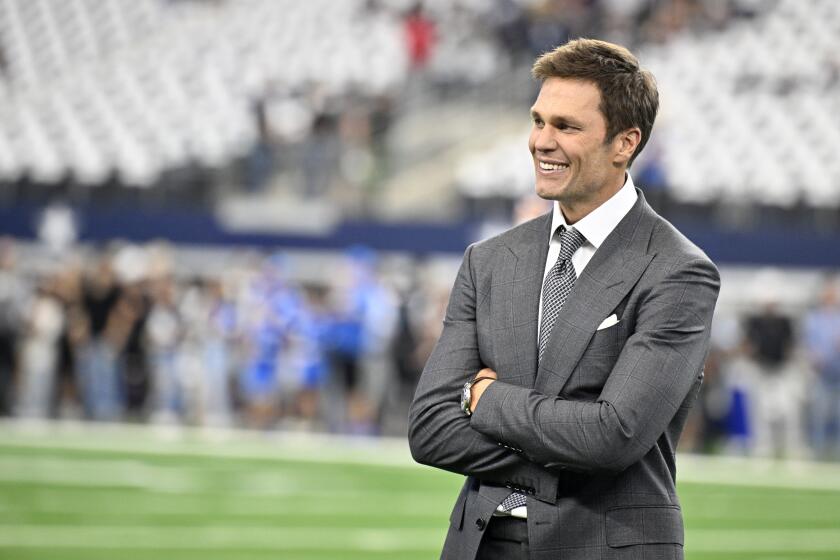Baseball Lawsuit Goes on Road
SAN FRANCISCO — The ball fight continues.
A seven-game World Series has come and gone. The trees are shedding russet and orange leaves. Sports talk has turned to basketball and hockey.
Yet the tawdry tussle over Barry Bonds’ record 73rd home run ball resumed Wednesday where it began more than three weeks ago.
When it is all over, estimated one participant in the civil lawsuit, the trial could end up costing close to the $1 million the record-setting ball is said to be worth to collectors.
“I would think that the cost to both parties would be a significant piece of what the ball is worth,” said Keith Kamisugi, a public relations spokesman for Patrick Hayashi, who ended up with the historic ball when the slugger knocked it into the stands at San Francisco’s Pacific Bell Park on Oct. 7, 2001.
In an unusual twist, part of the trial was held Wednesday before several hundred students at UC Hastings College of the Law in San Francisco.
Hastings law professor Marsha Cohen said she came up with the idea because of the extraordinary interest among the legal community. The case deals with areas in the law of property that have not been addressed since 1805, when they were debated in a landmark fox-hunting case.
Presiding Superior Court Judge Kevin McCarthy, who also teaches at Hastings, embraced the proposal for a round-table discussion among legal scholars -- three from the plaintiffs and one for the defense -- that took place Wednesday afternoon.
Martin Triano, attorney for Berkeley restaurateur Alex Popov, who first snagged the ball -- only to lose track of it in the resulting melee -- claims the whole courtroom fight could have been avoided if Hayashi had agreed to his client’s initial offer a year ago to “settle things over a beer.”
Despite four attempts at arbitration, two weeks in court and general ridicule in the San Francisco public arena, both claimants to the ball remain intransigent, dug in at the plate for the full count.
Testimony so far has included that of a 15-year-old fan who claimed that someone bit him on the leg in the dog-pile scramble for the ball and from a folksy major league umpire who told the court, “I’m a judge too, on the field.”
Umpire Jim Evans, a veteran of 28 years on the diamond, was brought in from Kissimmee, Fla., for the trial and paid $150 an hour for his efforts. A biomedical engineer called by the defense was paid $275 an hour. Each side in the suit has three lawyers, in a city where attorneys generally get from $200 to $500 an hour.
As a result of the spiraling costs, the prospect of reaching a Solomonesque solution in which the two sides split the proceeds from auctioning off the ball appears more and more remote.
“We will do whatever it takes to win,” said Hayashi attorney Donald Tamaki. “We had four opportunities, and in each case the other side rejected it.”
Attorney Triano said there are higher principles at stake, not just cash. He claims Popov, a strapping 6-footer, was mugged by riotous souvenir seekers.
“I don’t think anyone wants to see ballparks turned into European soccer riots,” Triano said.
“What’s it going to take: an 8-year-old child getting trampled to death?”
More to Read
Go beyond the scoreboard
Get the latest on L.A.'s teams in the daily Sports Report newsletter.
You may occasionally receive promotional content from the Los Angeles Times.










